At least 207 people died in Oregon while experiencing homelessness this year, from January through June.
The Register-Guard first reported the numbers released on an Oregon Health Authority dashboard, after Senate Bill 850 required all Oregon counties to track how many people die without shelter. The data tracking started in January, which was also the month that the most people died.

A walker is decorated with flowers, parked outside of a tent along SW 13th Avenue in Portland, April 4, 2022. Many campers stay in this area because of the close proximity Outside In where they are able to access support services.
Kristyna Wentz-Graff / OPB
Data show disparities among various demographics. Four times more men died than women, and 75% of the people who died were older than 45. Only one juvenile was reported. Less than half of the deaths happened in a medical or care facility.
Some populations were disproportionately impacted. Indigenous people experiencing homelessness died at a rate nearly six times higher than white Oregonians experiencing homelessness. Black people died at a rate nearly twice as high as white people who were also unhoused.
Medical officials listed 154 of the deaths as “natural” and 32 as “unintentional injury.” A small number were caused by homicide and suicide. Numbers for June are still being reported. The Oregon Health Authority said an annual reporting dashboard should be available in fall of next year.
Dear Reader,
For more than 100 years, OPB has offered reliable news and connection. Through wildfires, elections and economic downturns, OPB has been there to inform and connect our communities. Today, journalism faces new obstacles.
But this work is only possible because of people like you — readers who turn to articles like this and continue to engage with independent journalism in our community. If OPB has been a part of your life, if it has helped you see your community or the world more clearly, please consider making a contribution today.
— The OPB Team
Please select an amount to give. Your contribution ensures that fact-based reporting, cultural connection, and stories that strengthen our community remain freely available to everyone.



